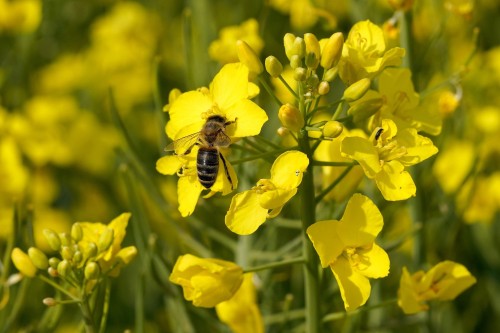
As government prepares to update the Sustainable Farming Incentive (SFI), a unique opportunity stands before policymakers: to shape farming support in a way that truly works for nature.
Previous iterations of SFI have been well-intentioned but have led, inadvertently, to a dominance of cereal-heavy rotations across UK farms. While such systems may deliver short-term simplicity, they fail to provide the diverse flowering crops and habitats our pollinators and wider farmland biodiversity urgently need.
It doesn’t have to be this way.
A thriving, productive, and nature-positive farming system is within reach — if policymakers seize this moment to back crops that offer multiple benefits for farm business and the environment.
The Power of Flowering Crops (Flower Power!)
Flowering break crops like oilseed rape (OSR), peas, beans and borage play a vital role in the landscape. These "melliferous" crops - those that produce nectar and pollen - act as essential food sources for pollinators. This is especially critical during the so-called “hunger gap” in early spring when little else is flowering but pollinators are emerging and active.
Recent pilot work in collaboration with AgriSound has revealed that bee activity in a flowering OSR crop is five times higher than in legume fallow, a recent SFI option promoted for soil health, weed control and biodiversity.
Yet under the current SFI structure, there is little incentive to include such crops. Pollinator-friendly species are not adequately recognised or rewarded, a concerning oversight as we aim to deliver the Government's environmental goals.
Learning from the Past
We need only look back a decade to see how policy can shape practice. Under the 2014 greening rules, crop diversity became a key focus: farmers were encouraged to include at least three different crops, and this drove a modest but meaningful shift towards broader rotations and environmental resilience.
We should be learning from this precedent, not turning away from it.
Instead, SFI as it stands has drifted towards simplicity at the expense of diversity, replacing flowering crops with alternatives and favouring cereals over everything else. This imbalance has knock-on effects for soil health, crop resilience, and the wildlife that depends on farmland for food and shelter.
A Blueprint for a Better Future
The next iteration of SFI must reinstate the value of flowering crops in the rotation, not as a niche add-on, but as a central pillar of sustainable, profitable farming. Now that the industry has come together to identify ways of sustainably increasing the production of oilseed rape under the OSR Reboot banner, we urge policymakers to:
- Recognise and reward melliferous crops like OSR, peas, beans, sunflowers and borage for their pollinator value, in the same way as flowering strips are rewarded, especially during the early spring hunger gap.
- Incentivise diverse rotations, not just through crop counts, but by recognising the environmental contribution of different crop types.
- Support companion and cover cropping systems that enhance flowering potential and biodiversity without compromising productivity.
Let’s Make SFI Deliver for Nature
There is no contradiction between productive farming and positive environmental outcomes but we must build policy that supports both. Flowering crops are already doing this job, quietly and effectively, across thousands of UK fields. We now need government to recognise their value and help farmers build rotations that work for their businesses and for biodiversity.
SFI 2.0 can be the turning point. Let’s make it deliver for pollinators, for diversity, and for the future of UK farming.
